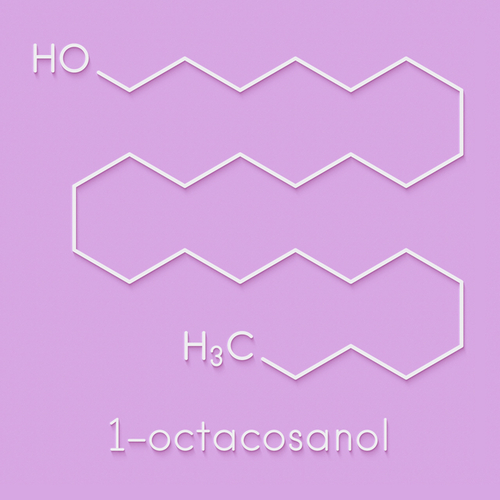
Background
Octacosanol might help to reduce levels of low-density lipoprotein (LDL or "bad") cholesterol and increase levels of high-density lipoprotein (HDL or "good") cholesterol. Octacosanol might also improve the health of fat cells.
People use octacosanol for athletic performance, Parkinson disease, amyotrophic lateral sclerosis (ALS, Lou Gehrig's disease), high cholesterol, and many other conditions, but there is no good scientific evidence to support these uses.
Don't confuse octacosanol with policosanol. These are not the same.
Safety Safety definitions
Special Precautions & Warnings:
Pregnancy and breast-feeding: There isn't enough reliable information to know if octacosanol is safe to use when pregnant or breast-feeding. Stay on the safe side and avoid use.Bleeding disorders: Octacosanol might slow blood clotting and increase the chance of bleeding in people with bleeding disorders.
Parkinson disease: Octacosanol might make some symptoms of Parkinson disease worse if it is used with the medication levodopa/carbidopa. Don't use this combination.
Surgery: Octacosanol might slow blood clotting and reduce blood sugar levels. It might increase the risk of bleeding or very low blood sugar levels during and after surgery. Stop using octacosanol at least 2 weeks before a scheduled surgery.
Effectiveness
Dosing & administration
Interactions with pharmaceuticals
Levodopa/Carbidopa (Sinemet)
Interaction Rating=Moderate Be cautious with this combination.
Levodopa/carbidopa is used for Parkinson disease. Taking octacosanol along with levodopa/carbidopa might make Parkinson disease symptoms worse. Do not take octacosanol if you are taking levodopa/carbidopa.
Medications for diabetes (Antidiabetes drugs)
Interaction Rating=Moderate Be cautious with this combination.
Octacosanol might lower blood sugar levels. Taking octacosanol along with diabetes medications might cause blood sugar to drop too low. Monitor your blood sugar closely.
Medications for high blood pressure (Beta-blockers)
Interaction Rating=Moderate Be cautious with this combination.
Octacosanol might lower blood pressure. Taking octacosanol along with medications that lower blood pressure might cause blood pressure to go too low. Monitor your blood pressure closely.
Medications that slow blood clotting (Anticoagulant / Antiplatelet drugs)
Interaction Rating=Moderate Be cautious with this combination.
Octacosanol might slow blood clotting. Taking octacosanol along with medications that also slow blood clotting might increase the risk of bruising and bleeding.
Nitroprusside (Nitropress)
Interaction Rating=Moderate Be cautious with this combination.
Octacosanol might increase the blood pressure lowering effects of nitroprusside.
Propranolol (Inderal)
Interaction Rating=Moderate Be cautious with this combination.
Octacosanol might increase the blood pressure lowering effects of propranolol.
Warfarin (Coumadin)
Interaction Rating=Moderate Be cautious with this combination.
Octacosanol might slow blood clotting. Warfarin also slows blood clotting. Taking octacosanol along with warfarin might increase the chances of bruising and bleeding. But it's not clear if this is a big concern. Until more is known, do not take too much octacosanol if you are also taking warfarin.
Interactions with herbs & supplements
Herbs and supplements that might slow blood clotting: Octacosanol might slow blood clotting and increase the risk of bleeding. Taking it with other supplements with similar effects might increase the risk of bleeding in some people. Examples of supplements with this effect include garlic, ginger, ginkgo, nattokinase, and Panax ginseng.




